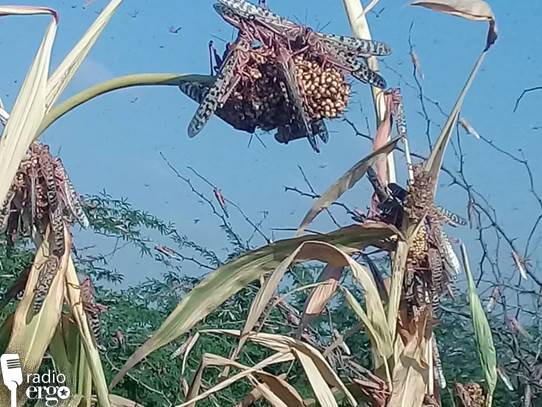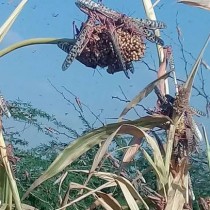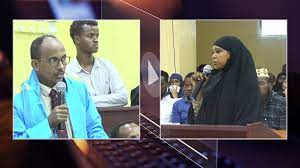
Locusts add to the woes of Somali farmers in flood-hit Hiran region
Farmers in central Somalia's Hiran region, whose farms were submerged by recent floods, are having to contend with swarms of locust devouring whatever they have planted since then.
Kadiye Abdi Gadod, a farmer in Hodug, 34 km west of Beletweyne town, told Radio Ergo that locust swarms have set on his farm just as he was preparing to harvest.
"They ruined everything; onions, watermelons, tomatoes and salads. I've got to start again from scratch. All my money and hard labour have gone to waste!" he complained.
According to the UN’s Food and Agriculture Organisation (FAO), the locusts have already destroyed tens of thousands of hectares of farmlands in the Horn of Africa. It is considered to be the worst invasion of locusts in a generation.
Mohamed Bashir Daqarre, Hirshabelle State deputy minister of agriculture, admits that the government has no means to tackle the locusts. However, they are assessing the damage caused to farmlands and grazing areas.
"The worst affected farmlands are in Bulaburde, Jalalaqsi, Beletweyne and Mahaday. When one swarm passes through, another one comes, so it’s not over yet and we have to keep assessing the situation. There are also other areas that we can’t access, due to insecurity, but they are nonetheless severely impacted,” said the deputy minister.
Ture Muhumed Afrahow, a farmer in Ba’ad, 21 km north of Beletweyen, told Radio Ergo that the locusts invaded his rain-fed farm at the end of December and destroyed all his crops, including sesame, watermelon and hay for the livestock.
"I’ve never seen such horrifying locusts. They settled on my green farm and turned it into a dry field in a very short time. They even stripped all the nearby bushes,” said Ture.
Farmers have been organizing themselves into groups and doing whatever they can to fight off the locusts.
Osman Mohamud Abdi, a farmer in Ba’ad, explained the various tactics they have been using to try to ward off the invading insects.
"We have been using every tool at our disposal. We fill jugs with small stones and shake them to make noise, we scream out loud, we even fire bullets, they keep coming. They were here just yesterday and today we saw them passing through an area just four or five kilometres from us,” said Osman.

Thursday January 16, 2020

Kadiye, a father of 11 children, feels doubly unfortunate. His farm was flooded last October when the river Shabelle over flowed. He persevered and planted vegetables after the waters receded, only to have his crops gobbled up by locusts. He said he is now living on loans.
According to the UN’s Food and Agriculture Organisation (FAO), the locusts have already destroyed tens of thousands of hectares of farmlands in the Horn of Africa. It is considered to be the worst invasion of locusts in a generation.
Mohamed Bashir Daqarre, Hirshabelle State deputy minister of agriculture, admits that the government has no means to tackle the locusts. However, they are assessing the damage caused to farmlands and grazing areas.
"The worst affected farmlands are in Bulaburde, Jalalaqsi, Beletweyne and Mahaday. When one swarm passes through, another one comes, so it’s not over yet and we have to keep assessing the situation. There are also other areas that we can’t access, due to insecurity, but they are nonetheless severely impacted,” said the deputy minister.
Ture Muhumed Afrahow, a farmer in Ba’ad, 21 km north of Beletweyen, told Radio Ergo that the locusts invaded his rain-fed farm at the end of December and destroyed all his crops, including sesame, watermelon and hay for the livestock.
"I’ve never seen such horrifying locusts. They settled on my green farm and turned it into a dry field in a very short time. They even stripped all the nearby bushes,” said Ture.
Farmers have been organizing themselves into groups and doing whatever they can to fight off the locusts.
Osman Mohamud Abdi, a farmer in Ba’ad, explained the various tactics they have been using to try to ward off the invading insects.
"We have been using every tool at our disposal. We fill jugs with small stones and shake them to make noise, we scream out loud, we even fire bullets, they keep coming. They were here just yesterday and today we saw them passing through an area just four or five kilometres from us,” said Osman.



 0
0 













Locusts add to the woes of Somali farmers in flood-hit Hiran region
Farmers in central Somalia's Hiran region, whose farms were submerged by recent floods, are having to contend with swarms of locust devouring whatever they have planted since then. Kadiye Abdi Gadod, a farmer in Hodug, 34 km west of Beletweyn